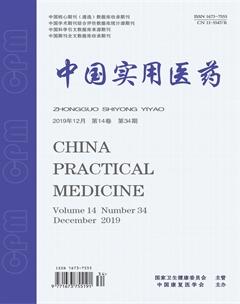男性早发型2型糖尿病的临床特点及与睾酮的关系
袁虎 许燕 茅丹

【摘要】 目的 了解男性早發型2型糖尿病(EDM)的临床特点并探讨其与睾酮之间的关系。
方法 选取54例男性EDM患者作为研究组, 另选取37例年龄≤40岁的糖代谢正常男性作为对照组。检测两组研究对象的一般指标、生化指标、内分泌激素, 并进行组间比较。结果 54例男性EDM患者中, 有17例(31.5%)肥胖患者, 18例(33.3%)超重患者;其中19例(35.2%)患者尿酮体阳性;高血压占24.1%(13/54), 高脂血症占66.7%(36/54), 脂肪肝占63.0%(34/54), 高尿酸血症占27.8%(15/54)。两组的年龄、舒张压、低密度脂蛋白胆固醇(LDL-C)、前列腺特异抗原(PSA)、游离前列腺特异抗原(fPSA)、空腹C肽、空腹胰岛素水平比较差异无统计学意义(P>0.05)。研究组的体质量指数(BMI)、收缩压、空腹血糖、糖化血红蛋白(HbA1c)、总胆固醇(TC)、甘油三酯(TG)水平均明显高于对照组, 差异具有统计学意义(P<0.05);而研究组的血红蛋白、白蛋白、高密度脂蛋白胆固醇(HDL-C)、尿酸、睾酮水平均显著低于对照组, 差异均具有统计学意义(P<0.05)。EDM患者的空腹胰岛素与睾酮水平呈正相关(r=0.524, P=0.012<0.05)。
结论 男性EDM患者存在严重的代谢紊乱, 睾酮可能通过影响胰岛素分泌参与了男性EDM的发生。
【关键词】 早发型2型糖尿病;男性;胰岛素;睾酮;代谢异常
DOI:10.14163/j.cnki.11-5547/r.2019.34.005
Clinical characteristics of male early-onset type 2 diabetes mellitus and its correlation with testosterone YUAN Hu, XU Yan, MAO Dan, et al. Department of Endocrinology, Affiliated Suzhou Hospital of Nanjing Medical University, Suzhou 215001, China
【Abstract】 Objective To understand the clinical characteristics of male early-onset type 2 diabetes mellitus (EDM) and its correlation with testosterone. Methods 54 male patients with EDM were selected as the research group, and 37 male patients with normal glucose metabolism ≤40 years old were selected as the control group. The general index, biochemical index and endocrine hormone of the two groups were detected and compared. Results Among 54 male EDM patients, 17 cases (31.5%) were obese, 18 cases (33.3%) were overweight, 19 cases (35.2%) were positive for urinary ketone body, 24.1%(13/54) were hypertension, 66.7%(36/54) were hyperlipidemia, 63.0%(34/54) were fatty liver, 27.8%(15/54) were hyperuricemia. There was no statistically significant difference in age, diastolic blood pressure, low-density lipoprotein cholesterol (LDL-C), prostate specific antigen (PSA), free prostate specific antigen (fPSA), fasting C peptide and fasting insulin levels between the two groups (P>0.05). The levels of body mass index (BMI), systolic blood pressure, fasting blood glucose, glycosylated hemoglobin (HbA1c), triglycerides (TC) and total cholesterol (TG) in the research group was obviously higher than those in the control group, and their difference was statistically significant (P<0.05). The levels of hemoglobin, albumin, high-density lipoprotein cholesterol (HDL-C), uric acid, testosterone in the research group was significantly lower than those in the control group, and their difference was statistically significant (P<0.05). There was a positive correlation between fasting insulin and testosterone in EDM patients (r=0.524, P=0.012<0.05). Conclusion There is a serious metabolic disorder in male patients with EDM. Testosterone may be involved in the development of EDM by influencing insulin secretion.
素[8]。因此, 早期干预高血压和高脂血症对预防EDM也非常重要。
此外, 作者还发现男性EDM患者的血浆睾酮水平显著低于对照组, 差异具有统计学意义(P<0.05)。睾酮水平在青春期达到峰值, 之后随着年龄增长而降低, 40歲之后下降更为明显。已有大量临床研究显示睾酮水平降低是T2DM的独立影响因素, 甚至低睾酮可以用来预测T2DM的发生[17]。Oh等[18]及丹麦哥本哈根的20年随访观察[3]提示低睾酮是男性T2DM的危险因素, 睾酮水平与T2DM之间存在显著的负相关。前列腺癌患者在接受雄激素剥夺治疗后, T2DM发生率显著上升, 这也印证了睾酮对血糖的调节作用[19]。目前有关睾酮与糖尿病等代谢疾病的研究都集中在中老年人群, 本研究首次报道了中国男性EDM患者睾酮降低, 说明睾酮水平对男性EDM的发生、发展起着重要作用。目前主要的观点均认为睾酮水平对维持胰岛素敏感性至关重要。目前的研究大多认为雄激素水平降低, 首先是影响脂质代谢紊乱, 导致向心性肥胖, 继而诱导了胰岛素抵抗的发生[20]。Jones 等[21]的研究显示T2DM及肥胖患者在睾酮治疗后胰岛素抵抗指数(HOMA-IR)可以下降15%。本研究发现睾酮水平与空腹胰岛素水平呈正相关。随着睾酮水平的下降, 空腹胰岛素水平降低。之前的国内研究也提示EDM较迟发型有更严重的胰岛β细胞功能衰退, 本研究提示在初次诊断的男性EDM患者, 尿酮体阳性率达35.2%。提示在中国EDM, 特别是男性EDM胰岛β细胞功能衰退出现较早。
本研究通过对初次诊断的男性EDM患者进行临床观察, 发现男性EDM患者有严重的代谢紊乱、胰岛素抵抗, 而这些都是心脑血管疾病的高危因素, 对于肥胖的青年男性, 特别是伴有高血压、高血脂等代谢异常的人群应该进行早期的积极干预。男性EDM患者睾酮降低明显, 且可能通过调节胰岛素的分泌促进糖尿病的发生发展。但睾酮替代治疗的有效性及安全性仍存在较多的争议, 有待进一步的研究, 特别是大规模的临床研究来证实。
参考文献
[1] Cowie CC, Rust KF, Ford ES, et al. Full accounting of diabetes and pre-diabetes in the U. S. population in 1988-1994 and 2005-2006. Diabetes Care, 2009, 32(2):287-294.
[2] Sharma M, Nazareth I, Petersen I. Trends in incidence, prevalence and prescribing in type 2 diabetes mellitus between 2000 and 2013 in primary care: a retrospective cohort study. Bmj Open, 6(1):e010210.
[3] Holmboe SA, Jensen TK, Linneberg A, et al. LowTestosterone: ARiskMarkerRather Than aRisk FactorforType 2 Diabetes. J Clin Endocrinol Metab, 2016, 101(8):3180-3190.
[4] Cai X, Tian Y, Wu T, et al. Metabolic effects of testosterone replacement therapy on hypogonadal men with type 2 diabetes mellitus: a systematic review and meta-analysis of randomized controlled trials. Asian J Androl, 2014(1):146-152.
[5] Ma RCW, Chan JCN. Type 2 diabetes in East Asians: Similarities and differences with populations in Europe and the United States. Annals of the New York Academy of Sciences, 2013, 1281(1):64-91.
[6] Zou X, Zhou X, Ji L, et al. The characteristics of newly diagnosed adult early-onset diabetes: a population-based cross-sectional study. Scientific Reports, 2017(7):46534.
[7] Hatunic M, Burns N, Finucane F, et al. Contrasting clinical and cardiovascular risk status between early and later onset type
2 diabetes. Diabetes & vascular disease research: official journal of the International Society of Diabetes and Vascular Disease, 2005, 2(2):73-75.
[8] Yu H, Xie LF, Chen K, et al. Initiating Characteristics of Early-onset Type 2 Diabetes Mellitus in Chinese Patients. Chin Med J (Engl), 2016, 129(7):778-784.
[9] Burns N, Finucane FM, Hatunic M, et al. Early-onset type
2 diabetes in obese white subjects is characterised by a marked defect in beta cell insulin secretion, severe insulin resistance and a lack of response to aerobic exercise training. Diabetologia, 2007, 50(7):1500-1508.
[10] Golubic R, Wijndaele K, Sharp SJ, et al. Physical activity, sedentary time and gain in overall and central body fat: 7-year follow-up of the ProActive trial cohort. Int J Obes (Lond), 2015, 39(1):142-148.
[11] Irving R, Tusie-Luna MT, Mills J, et al. Early onset type 2 diabetes in Jamaica and in Mexico. Opportunities derived from an interethnic study. Rev Invest Clin, 2011, 63(2):198-209.
[12] Jimenez-Corona A, Rojas R, Gomez-Perez FJ, et al. Early-onset type 2 diabetes in a Mexican survey: results from the National Health and Nutrition Survey 2006. Salud Publica Mex, 2010(52Suppl 1):S27-S35.
[13] 唐秀玲. 早發2型糖尿病临床特点及相关危险因素分析. 中国全科医学, 2012, 15(14):1562-1565.
[14] Zhang M, Mao J, Tuerdi A, et al. The Constellation of Macrovascular Risk Factors in Early Onset T2DM: A Cross-Sectional Study in Xinjiang Province, China. J Diabetes Res, 2018(2018):3089317.
[15] Rhodes ET, Prosser LA, Hoerger TJ, et al. Estimated morbidity and mortality in adolescents and young adults diagnosed with Type 2 diabetes mellitus. Diabet Med, 2012, 29(4):453-463.
[16] Wong J, Molyneaux L, Constantino M, et al. Timing is everything: age of onset influences long-term retinopathy risk in type 2 diabetes, independent of traditional risk factors. Diabetes Care, 2008, 31(10):1985-1990.
[17] Allan CA. Sex steroids and glucose metabolism. Asian J Androl, 2014, 16(2):232-238.
[18] Oh JY, Barrett-Connor E, Wedick NM, et al. Endogenous sex hormones and the development of type 2 diabetes in older men and women: the Rancho Bernardo study. Diabetes Care, 2002, 25(1):55-60.
[19] Haidar A, Yassin A, Saad F, et al. Effects of androgen deprivation on glycaemic control and on cardiovascular biochemical risk factors in men with advanced prostate cancer with diabetes. Aging Male, 2007, 10(4):189-196.
[20] Vandenput L, Mellstrom D, Lorentzon M, et al. Androgens and glucuronidated androgen metabolites are associated with metabolic risk factors in men. J Clin Endocrinol Metab, 2007, 92(11):4130-4137.
[21] Jones TH, Arver S, Behre HM, et al. Testosterone replacement in hypogonadal men with type 2 diabetes and/or metabolic syndrome (the TIMES2 Study). Diabetes Care, 2011, 34(4):828-837.
[收稿日期:2019-08-28]

